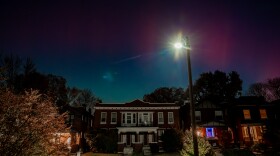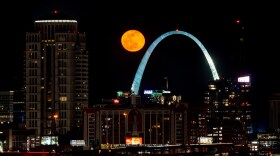-
Are you chasing the northern lights in Missouri and Illinois? St. Louis Public Radio Visuals Editor Brian Munoz shares how to spot the rare show — and document it on your phone or camera while it lasts.
-
Arlo Landolt was born and raised in Madison County, Illinois. He attended a one-room country schoolhouse where eight grades were taught by one teacher.
-
The data Europa Clipper receives will help scientists develop a better sense of the moon's structure, what materials may exist within it and whether it could sustain life.
-
A new sensor would help scientists learn more about the mineral and elemental composition of the moon. There’s already some understanding of the elements and minerals that make up the surface of the moon but not on the far side or poles.
-
Astrophysicist and author Erika Nesvold spoke with host Elaine Cha before a live audience at the McDonnell Planetarium as part of Missouri Humanities’ keynote event.
-
Throughout most of human history, lunar and solar eclipses were considered to be bad omens, and the fates of many have been determined by the celestial phenomenon.
-
Researchers and state officials in Illinois and Missouri are preparing to welcome thousands of people who hope to catch the next total solar eclipse to the southern parts of their states in early April.
-
Astrology has captured the attention of philosophers, political leaders and the general populace for millennia. How has it remained a staple in pop culture?
-
The project that has been years in the making and involved dozens of students from different disciplines is set to launch on a SpaceX rocket in February. The school hopes it’s the first of many student-run projects that make it to space.
-
In less than a year, St. Louis will be within a two-hour drive of the path of totality.
Play Live Radio
Next Up:
0:00
0:00
Available On Air Stations










